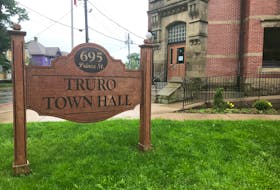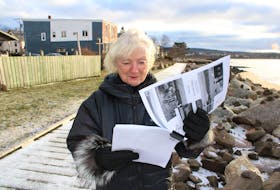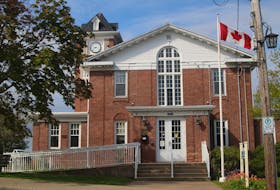
For starters, everyone calls him Chris, never Mr. Cochrane at Chief Jimmy Bruneau Regional High School. Meet the Teacher takes place when teachers visit students’ families in their homes at the start of the school year. He regularly takes his students on overnight camping trips. If they are lucky, they’ll shoot and skin a moose and take it home with them. School is never, ever closed because of stormy weather. And sometimes parents graduate alongside their sons and daughters.
Cochrane teaches in the self-governed Tlicho region of the Northwest Territories where he and his partner Dorothy, are raising their three children. They live beyond the MacKenzie River on the northern arm of the Great Slave Lake, an hour northwest of Yellowknife.
“It is Dorothy’s home and all her family is there and it is my home too, but by the time the school year ends, I can’t wait to get back to my other home, which is Pictou County,” he said.
Visiting his parents, Carol and George, and his brother, who has a family in Bedford, is the top priority, but he also craves Sam’s pizza and Ming’s Chinese food.
After graduating from the then University College of Cape Breton and University of Prince Edward Island, Cochrane, 39, couldn’t find a job teaching. A couple of friends were teaching in Behchoko, N.W.T., a hub community of 1,800 people, and he sold his car to finance a trip to visit them, thinking it might be his only opportunity to see the north.
“I substituted one day and then I was hired. An opening came up suddenly and because I was already there, they gave me the job. ”
He taught in that school for 10 years before moving across the lake to the smaller community of Edzo where a K-12 school is located.
“When I started teaching, I coached soccer, basketball, track and cross country. Another guy and I also ran hockey clinics on Saturday mornings. Through sports I got to know the kids better and it gave me the chance to visit different communities while gradually developing some standing with people in the area.”
Towards the end of his first year, he was enjoying himself enough that he wanted to come back, at least for another year. He repeatedly had to tell his students he would be back next year.
“I came home for the summer, bought a truck at Bob Allen’s and drove back out by myself. I remember the kids being so surprised to see me again. There is a lot of staff turnover, though less than in my early years, and I’m currently one of the longest-serving teachers. They don’t even ask me anymore if I am coming back.”
While Cochrane embraced the opportunity to be immersed in a new culture, everything did not come easily.
“In the beginning I had a hard time understanding people when they spoke English to me, let alone Tlicho. The language, which is very different phonetically and in tone, is still strong in our community and I understand some and speak a little but my accent is a big joke. Even when I think I’ve got something perfectly, they laugh at me, but it is good natured.”
Dorothy, an educational assistant, speaks Tlicho with their children and it is taught, either by immersion or along with English, in the schools. Cochrane notes the community’s motto is “strong like two people,” meaning people must be educated in the traditional ways and in the “white man’s ways.”
“In the north we are still very much dealing with the aftermath of residential schools. It is part of that legacy that not everyone appreciates non-aboriginal teachers and there is not always a high level of trust, so that is why we go to the students’ homes and meet the parents on their own territory. It is the teacher reaching out to the parents or grandparents, but in my experience it is very rewarding for the teacher and everyone benefits.”
Before he went to the north, Cochrane did not consider himself an outdoorsman and had never hunted.
“Friends in the community took me out caribou hunting for the first time. Part of my orientation as a new teacher was to fly in a floatplane 200-300 kilometres north to the barren lands. There we’d camp for three days with elders. We’d shoot and skin a caribou, then wrap it in its hide and drag it back to camp. You can be sure I was keeping an eye out for the big Arctic grizzlies that sometimes show up.”
Part of the school curriculum requires that students be taken out onto the land for short periods.
“With the younger ones, we go by Ski-Doo or toboggan and stay one night. With the older kids, it is longer and there are more goals.”
The out on the land adventures sometimes serve to accentuate differences between Cochrane and Tlicho people.
“Sometimes staff and elders will come to me and say they want to take the kids out tomorrow and all they need is a bush order. I’m not that spontaneous and I need a plan and I have a long list of things I need to address, not the least of which is insurance.”
It is the same thing in his personal life.
“Before we had kids, Dorothy might decide at 10 p.m. to go to Yellowknife. Her family is the same, but I’m thinking that’s not how we do things in Nova Scotia; we plan ahead.”
Cochrane stayed in the territories for a couple of summers, so he could canoe and explore, but since the children came along, the pull to bring them to Pictou County is strong.
“We want them to know their family here and to know what it is like where I grew up. The boys are in swimming lessons at Trenton Park and then there’s Kinsmen baseball, but it was really funny to see the baby reluctant to put her feet down in the grass. We have very little grass in Edzo, so it was all new and strange to her.”
Housing is one of the big challenges in Edzo and the family has outgrown its rented quarters.
“On the one hand, we should be putting the cost of our trip home toward housing but on the other, you can’t really put a value on time you spend with your family and for us the distance is so great. To get to Nova Scotia, we drive an hour to Yellowknife, then fly to Edmonton, then to Calgary, then to Toronto and finally to Halifax. With three little kids, it is quite the journey.”
It is a journey that will be repeated in reverse in a few weeks as school begins for Cochrane Aug. 18.
“By the time the kids come back to school, it won’t get dark until 11:30 p.m. and then by January, the sun won’t come up until 10:30 a.m. and by 2:30 p.m., it is dark again. That took some getting used to and then there is the cold. Skinning a caribou at -45 degrees is a real experience.”
Rosalie MacEachern is a Stellarton resident and freelance writer who seeks out people who work behind the scenes on hobbies or jobs that they love the most. If you have someone you think should she should profile in an upcoming article, she can be reached at [email protected]








